初二英语语法 反义疑问句
反义疑问句 初中英语 语法
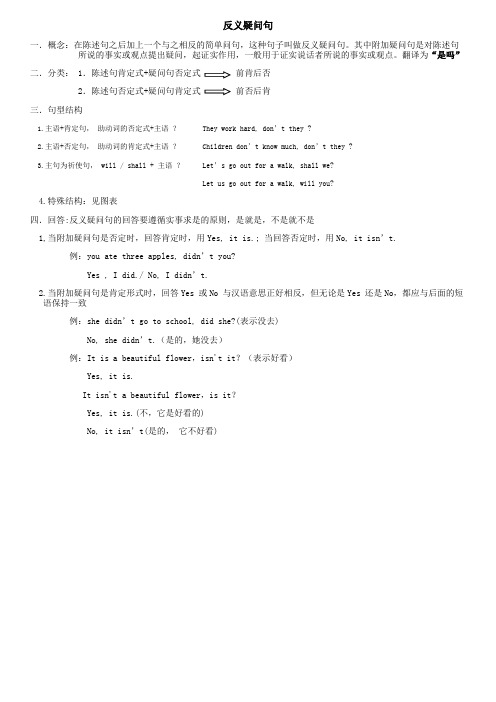
反义疑问句一.概念:在陈述句之后加上一个与之相反的简单问句,这种句子叫做反义疑问句。
其中附加疑问句是对陈述句所说的事实或观点提出疑问,起证实作用,一般用于证实说话者所说的事实或观点。
翻译为“是吗”二.分类: 1.陈述句肯定式+疑问句否定式前肯后否2.陈述句否定式+疑问句肯定式前否后肯三.句型结构1.主语+肯定句,助动词的否定式+主语?They work hard, don’t they ?2.主语+否定句,助动词的肯定式+主语? Children don’t know much, don’t they ?3.主句为祈使句, will / shall + 主语? Let’s go out for a walk, shall we?Let us go out for a walk, will you?4.特殊结构:见图表四.回答:反义疑问句的回答要遵循实事求是的原则,是就是,不是就不是1,当附加疑问句是否定时,回答肯定时,用Yes, it is.; 当回答否定时,用No, it isn’t.例:you ate three apples, didn’t you?Yes , I did./ No, I didn’t.2.当附加疑问句是肯定形式时,回答Yes 或No 与汉语意思正好相反,但无论是Yes 还是No,都应与后面的短语保持一致例:she didn’t go to school, did she?(表示没去)No, she didn’t.(是的,她没去)例:It is a beautiful flower,isn't it?(表示好看)Yes, it is.It isn't a beautiful flower,is it?Yes, it is.(不,它是好看的)No, it isn’t(是的,它不好看)。
初中英语反意疑问句规则

初中英语反意疑问句规则
初中英语中,反意疑问句的规则如下:
1.反意疑问句是由一个陈述句和一个简短的疑问句组成的,两者用逗号分隔。
2.如果陈述句是肯定的,反意疑问句的疑问部分就使用否定形式;如果陈述句是否定的,疑问部分则使用肯定形式。
3.如果陈述句中使用了情态动词或助动词,疑问部分使用这些词的原形,并且在句末加上主语。
4. 如果陈述句中没有情态动词或助动词,疑问部分使用
do/does/did加上not或短语动词中的not,并且在句末加上主语。
5. 如果陈述句中有两个主语,疑问部分使用which而不使用who。
6.如果陈述句中有其中一种程度的副词或表示祈使句的动词,疑问部分使用这些词,并且在句末加上主语。
以下是一些例句:
1. You don't like ice cream, do you?
2. He can't swim, can he?
3. She has finished her homework, hasn't she?
4. They didn't go to the park, did they?
5. Tom and John are playing basketball, aren't they?
6. Be careful, will you?。
初中英语语法之反义疑问句
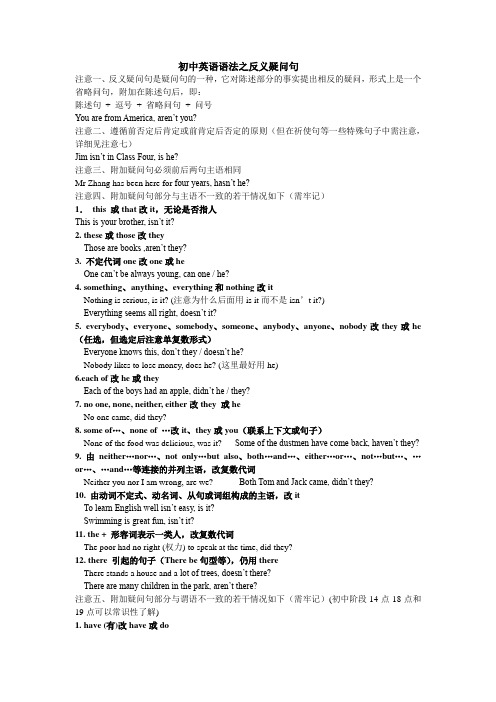
初中英语语法之反义疑问句注意一、反义疑问句是疑问句的一种,它对陈述部分的事实提出相反的疑问,形式上是一个省略问句,附加在陈述句后,即:陈述句+ 逗号+ 省略问句+ 问号Y ou are from America, aren’t you?注意二、遵循前否定后肯定或前肯定后否定的原则(但在祈使句等一些特殊句子中需注意,详细见注意七)Jim isn’t in Class Four, is he?注意三、附加疑问句必须前后两句主语相同Mr Zhang has been here for four years, hasn’t he?注意四、附加疑问句部分与主语不一致的若干情况如下(需牢记)1.this 或that改it,无论是否指人This is your brother, isn’t it?2. these或those改theyThose are books ,aren’t they?3. 不定代词one改one或heOne can’t be always young, can one / he?4. something、anything、everything和nothing改itNothing is serious, is it? (注意为什么后面用is it而不是isn’t it?)Everything seems all right, doesn’t it?5. everybody、everyone、somebody、someone、anybody、anyone、nobody改they或he (任选,但选定后注意单复数形式)Everyone knows this, don’t they / doesn’t he?Nobody likes to lose money, does he? (这里最好用he)6.each of改he或theyEach of the boys had an apple, didn’t he / they?7. no one, none, neither, either改they 或heNo one came, did they?8. some of…、none of …改it、they或you(联系上下文或句子)None of the food was delicious, was it? Some of the dustmen have come back, haven’t they?9. 由neither…nor…、not only…but also、both…and…、either…or…、not…but…、…or…、…and…等连接的并列主语,改复数代词Neither you nor I am wrong, are we? Both Tom and Jack came, didn’t they?10. 由动词不定式、动名词、从句或词组构成的主语,改itTo learn English well isn’t easy, is it?Swimming is great fun, isn’t it?11. the + 形容词表示一类人,改复数代词The poor had no right (权力) to speak at the time, did they?12. there 引起的句子(There be句型等),仍用thereThere stands a house and a lot of trees, doesn’t there?There are many children in the park, aren’t there?注意五、附加疑问句部分与谓语不一致的若干情况如下(需牢记)(初中阶段14点18点和19点可以常识性了解)1. have (有)改have或doMary has two brothers, doesn’t she / hasn’t she?2. have (有)必须与陈述部分一致He hasn’t a lot of time, h as he?Miss Green doesn’t have any money in her pocket, does she?3. have不做“有”解释,必须用doThey all have a good time, don’t they?4. have to用do或haveWe have to get up early, don’t we / haven’t we?5. have got to用haveWe have got to answer all the questi ons, haven’t we?6. had better用should或hadWe had better go right now, shouldn’t we / hadn’t we?7. can’t(不可能,表示推测)根据can’t或的动词选择相应的形式He can’t be a doctor, is he? The workers can’t have finished their work, have they?8. may 用may + 主语+ not (英语中不用mayn’t)They may be here next week, may they not?9. must(必须)用needn’tY ou must do it today, needn’t you?10. must(应该)用mustn’tI must study hard, mustn’t I?11. mustn’t用must或mayY ou mustn’t talk like that, must you? We mustn’t stay here any lo nger, must we?12. “must be”对现在情况进行推测作一般现在时或现在进行时的附加疑问句进行处理2 反义疑问句He must be happy, isn’t he? He must be working hard at the office, isn’t he?must表示推测时,也有用mustn’t的He must have been working very hard, mustn’t he?Y ou must have told Mr W ang the secret, mustn’t you?13. “must + 完成时”表示对过去情况的推测,作一般过去时附加疑问句处理He must have come yesterday, didn’t he? Y ou must have seen the play last week, didn’t you?14. “must + 完成时”用来推测过去的动作持续到现在按现在完成时的附加疑问句来处理Y ou must have studied English for years, haven’t you?He must have lived here for at least ten years, hasn’t he?14. 实义动词need和dear用doHe needs help, doesn’t he? I have never dared to ask him, have I?15. 情态动词need和dear用need和dearHe dare not say so, dare he? We need not do it again, need we?16. needn’t 用need或mustY ou needn’t go yet, need you? He needn’t do that, must he?17. “would rather + 动词原形”和“would like to + 动词原形”用wouldn’tHe would rather read the text ten times than recite it, wouldn’t he?Y ou’d like to have some bananas, wouldn’t you?18. “ought to + 动词原形”用oughtn’t 或shouldn’tThe child ought to be punished, oughtn’t he?We ought to go there, shouldn’t we?19. “used to + 动词原形”用“didn’t + 主语”或“usedn’t + 主语”或“used + 主语+ not”He used to live in Lon don, usedn’t he / didn’t he?He used to play football when he was a child , used he not?注意六、句子中有seldom, hardly, no, not, never, few, little, nothing, nobody, nowhere等是否定句,附加疑问部分必须采用肯定形式Nobody phoned while I was out, did they?He is hardly able to swim, is he? There is little ink in your pen, is there?no one, nobody, none, nothing, neither等作动词的宾语时,附加疑问部分一般采用肯定形式(也偶尔用否定形式)He has nothing to say, does(n’t) he? Y ou got nothing from him, did(n’t) you?注意七、一些特殊句型的附加疑问句1. I am…改aren’t II am your friend, aren’t I?2. I wish to do sth或I wish I …改may II wish to go home, may I? I wish I were you, may I?3. 主从复合句,与主句的主谓语保持一致He says that I did it, doesn’t he?David wouldn’t go there if it rained, would he?4. 并列句,与邻近的分句保持一致Mary is a nice girl, but she had one short-coming, hadn’t she?5. 表示邀请,请求的祈使句,附加疑问部分用will you或won’t you或would you等,一般只要记住will you就可以了,不遵循前否定后肯定或前肯定后否定的原则Come here, will you? Turn off the light, will you? Do sit down, will you?6. 表示告诉别人做某事的祈使句,用will you、can you、would you或can’t you、won’t youStop talking, can you? Write down the new words, will you / won’t you?7. 否定的祈使句用will you或can youDon’t make a noise, will / can you?8. Let me …用will you 或may ILet me help you, may I? Let me do it, will you?9. Let’s …表示建议包括听话人在内,用shall weLet’s go for a walk, shall we?10. let us …表示允许,不包括听话人在内,用will youLet us do it by ourselves, will you?11. Let接第三人称宾语时用will youLet him come in, will you?12. Let’s not …用OK或all rightLet’s not go to the party, OK / all right?13. 感叹句用一般现在时b e的形式(故事中用一般过去时b e的形式)What fine weather, isn’t it?How clever the boy is, isn’t he?How hard she works, isn’t she?。
初二英语反义疑问句的知识点总结
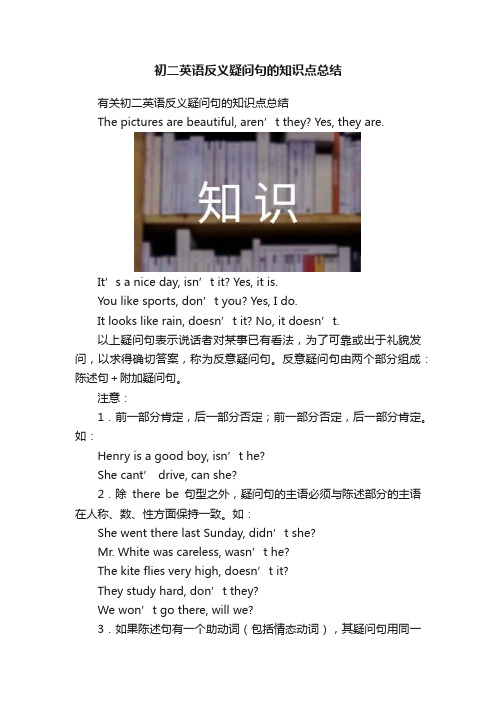
初二英语反义疑问句的知识点总结有关初二英语反义疑问句的知识点总结The pictures are beautiful, aren’t they? Yes, they are.It’s a nice day, isn’t it? Yes, it is.You like sports, don’t you? Yes, I do.It looks like rain, doesn’t it? No, it doesn’t.以上疑问句表示说话者对某事已有看法,为了可靠或出于礼貌发问,以求得确切答案,称为反意疑问句。
反意疑问句由两个部分组成:陈述句+附加疑问句。
注意:1.前一部分肯定,后一部分否定;前一部分否定,后一部分肯定。
如:Henry is a good boy, isn’t he?She cant’ drive, can she?2.除there be句型之外,疑问句的主语必须与陈述部分的主语在人称、数、性方面保持一致。
如:She went there last Sunday, didn’t she?Mr. White was careless, wasn’t he?The kite flies very high, doesn’t it?They study hard, don’t they?We won’t go there, will we?3.如果陈述句有一个助动词(包括情态动词),其疑问句用同一助动词(情态动词)。
如:You can swim, can’t you?He hasn’t met my sister, has he?4.当陈述句是“I’m +表语”时,由于“am not”无省略形式,附加疑问句用“aren’t I”代替。
如:I’m late, aren’t I?I’m a student, aren’t I?5.当陈述部分是祈使句时,后面的附加疑问句用will you? /won’t you?/can you? /can’t you?祈使句的否定结构后只能用will you? 如:Open the window, won’t you?Sit down, can you?Don’t forget, will you?6.如果陈述句是there be结构,在附加疑问句中用be not there 结构? 如:There is something wrong, isn’t there?There won’t be any trouble, will there?7.当前面的陈述句中有含否定意义的如no, never, hardly等词时,应视为否定句,其后的附加疑问句应用肯定。
初中英语语法_反意疑问句
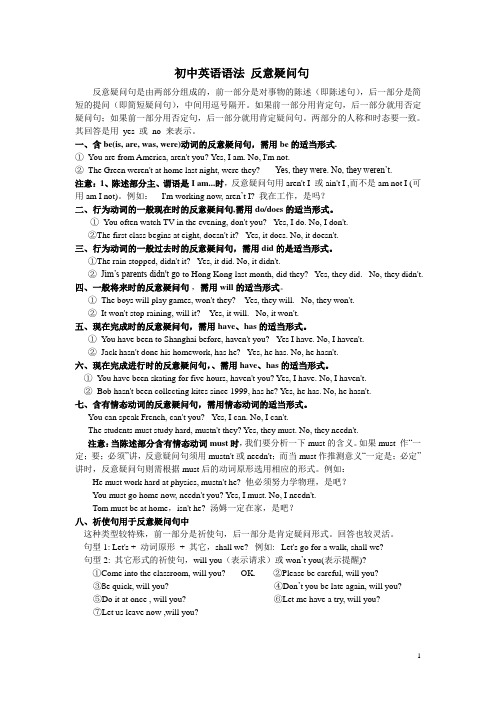
初中英语语法反意疑问句反意疑问句是由两部分组成的,前一部分是对事物的陈述(即陈述句),后一部分是简短的提问(即简短疑问句),中间用逗号隔开。
如果前一部分用肯定句,后一部分就用否定疑问句;如果前一部分用否定句,后一部分就用肯定疑问句。
两部分的人称和时态要一致。
其回答是用yes 或no 来表示。
一、含be(is, are, was, were)动词的反意疑问句,需用be的适当形式.①You are from America, aren't you? Yes, I am. No, I'm not.②The Green weren't at home last night, were they? Yes, they were. No, they weren’t.注意:1、陈述部分主、谓语是I am...时,反意疑问句用aren't I 或ain't I ,而不是am not I (可用am I not)。
例如:I'm working now, aren’t I? 我在工作,是吗?二、行为动词的一般现在时的反意疑问句,需用do/does的适当形式。
①You often watch TV in the evening, don't you? Yes, I do. No, I don't.②The first class begins at eight, doesn't it? Yes, it does. No, it doesn't.三、行为动词的一般过去时的反意疑问句,需用did的是适当形式。
①The rain stopped, didn't it? Yes, it did. No, it didn't.②Jim’s parents didn't go to Hong Kong last month, did they? Yes, they did. No, they didn't.四、一般将来时的反意疑问句,需用will的适当形式。
初二英语语法_反义疑问句
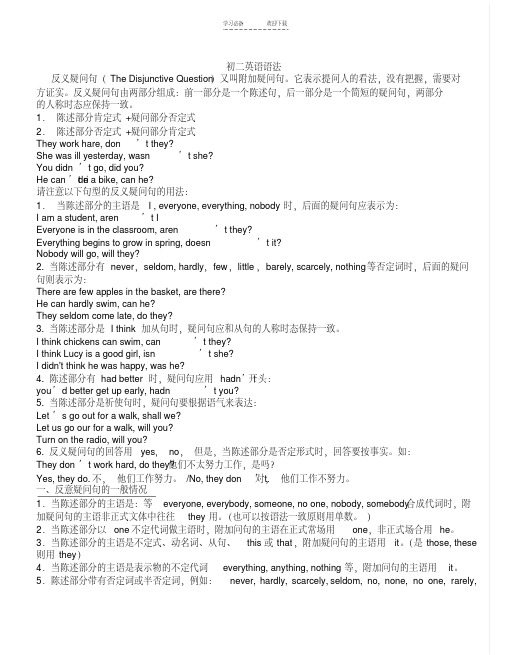
学习必备欢迎下载初二英语语法反义疑问句(The Disjunctive Question)又叫附加疑问句。
它表示提问人的看法,没有把握,需要对方证实。
反义疑问句由两部分组成:前一部分是一个陈述句,后一部分是一个简短的疑问句,两部分的人称时态应保持一致。
1.陈述部分肯定式+疑问部分否定式2.陈述部分否定式+疑问部分肯定式They work hare, don’t they?She was ill yesterday, wasn’t she?You didn’t go, did you?de a bike, can he?He can’t ri请注意以下句型的反义疑问句的用法:1.当陈述部分的主语是I , everyone, everything, nobody 时,后面的疑问句应表示为:I am a student, aren’t IEveryone is in the classroom, aren’t they?Everything begins to grow in spring, doesn’t it?Nobody will go, will they?2. 当陈述部分有never,seldom, hardly,few,little,barely, scarcely, nothing 等否定词时,后面的疑问句则表示为:There are few apples in the basket, are there?He can hardly swim, can he?They seldom come late, do they?3. 当陈述部分是I think 加从句时,疑问句应和从句的人称时态保持一致。
I think chickens can swim, can’t they?I think Lucy is a good girl, isn’t she?I didn't think he was happy, was he?开头:4. 陈述部分有had better 时,疑问句应用hadn’tyou’d better get up early, hadn’t you?5. 当陈述部分是祈使句时,疑问句要根据语气来表达:Let’s go out for a walk, shall we?Let us go our for a walk, will you?Turn on the radio, will you?6. 反义疑问句的回答用yes,no,但是,当陈述部分是否定形式时,回答要按事实。
反义疑问句知识点详解(初中英语专项复习)1
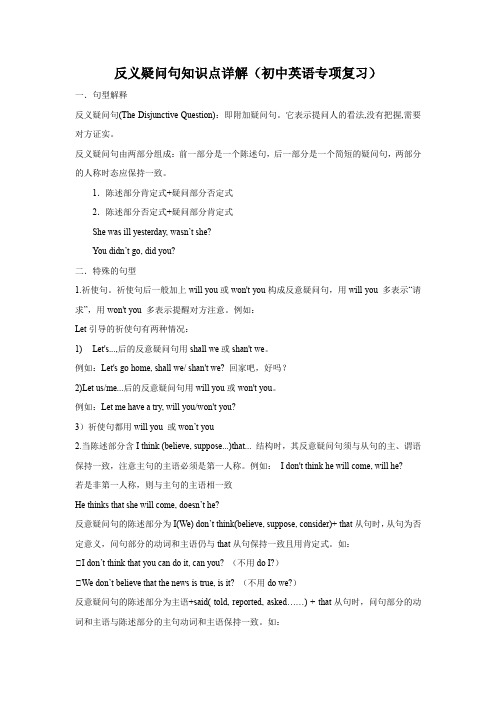
反义疑问句知识点详解(初中英语专项复习)一.句型解释反义疑问句(The Disjunctive Question):即附加疑问句。
它表示提问人的看法,没有把握,需要对方证实。
反义疑问句由两部分组成:前一部分是一个陈述句,后一部分是一个简短的疑问句,两部分的人称时态应保持一致。
1.陈述部分肯定式+疑问部分否定式2.陈述部分否定式+疑问部分肯定式She was ill yesterday, wasn’t she?You didn’t go, did you?二.特殊的句型1.祈使句。
祈使句后一般加上will you或won't you构成反意疑问句,用will you 多表示“请求”,用won't you 多表示提醒对方注意。
例如:Let引导的祈使句有两种情况:1)Let's...,后的反意疑问句用shall we或shan't we。
例如:Let's go home, shall we/ shan't we? 回家吧,好吗?2)Let us/me...后的反意疑问句用will you或won't you。
例如:Let me have a try, will you/won't you?3)祈使句都用will you 或won’t you2.当陈述部分含I think (believe, suppose...)that... 结构时,其反意疑问句须与从句的主、谓语保持一致,注意主句的主语必须是第一人称。
例如:I don't think he will come, will he?若是非第一人称,则与主句的主语相一致He thinks that she will come, doesn’t he?反意疑问句的陈述部分为I(We) don’t think(believe, suppose, consider)+ that从句时,从句为否定意义,问句部分的动词和主语仍与that从句保持一致且用肯定式。
初中英语语法——反意疑问句讲解(附答案)
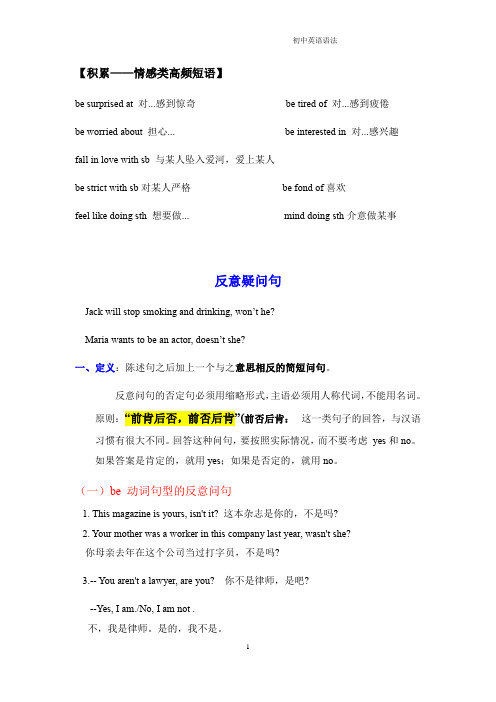
【积累——情感类高频短语】be surprised at 对...感到惊奇be tired of 对...感到疲倦be worried about 担心... be interested in 对...感兴趣fall in love with sb 与某人坠入爱河,爱上某人be strict with sb对某人严格be fond of喜欢feel like doing sth 想要做... mind doing sth介意做某事反意疑问句Jack will stop smoking and drinking, won’t he?Maria wants to be an actor, doesn’t she?一、定义:陈述句之后加上一个与之意思相反的简短问句。
反意问句的否定句必须用缩略形式,主语必须用人称代词,不能用名词。
原则:“前肯后否,前否后肯”(前否后肯:这一类句子的回答,与汉语习惯有很大不同。
回答这种问句,要按照实际情况,而不要考虑yes和no。
如果答案是肯定的,就用yes;如果是否定的,就用no。
(一)be 动词句型的反意问句1. This magazine is yours, isn't it? 这本杂志是你的,不是吗?2. Your mother was a worker in this company last year, wasn't she?你母亲去年在这个公司当过打字员,不是吗?3.-- You aren't a lawyer, are you? 你不是律师,是吧?--Yes, I am./No, I am not .不,我是律师。
是的,我不是。
4. --He isn’t sleeping, is he?(二)实意动词句型的反意问句1. -- She likes eating fish, doesn't she?她喜欢吃鱼,不是吗?--Yes, she does. /No, she doesn't.是的,她喜欢。
- 1、下载文档前请自行甄别文档内容的完整性,平台不提供额外的编辑、内容补充、找答案等附加服务。
- 2、"仅部分预览"的文档,不可在线预览部分如存在完整性等问题,可反馈申请退款(可完整预览的文档不适用该条件!)。
- 3、如文档侵犯您的权益,请联系客服反馈,我们会尽快为您处理(人工客服工作时间:9:00-18:30)。
初二英语语法反义疑问句(The Disjunctive Question)又叫附加疑问句。
它表示提问人的看法,没有把握,需要对方证实。
反义疑问句由两部分组成:前一部分是一个陈述句,后一部分是一个简短的疑问句,两部分的人称时态应保持一致。
1.陈述部分肯定式+疑问部分否定式2.陈述部分否定式+疑问部分肯定式They work hare, don’t they?She was ill yesterday, wasn’t she?Y ou didn’t go, did you?He can’t ri de a bike, can he?请注意以下句型的反义疑问句的用法:1.当陈述部分的主语是I , everyone, everything, nobody 时,后面的疑问句应表示为:I am a student, aren’t IEveryone is in the classroom, aren’t they?Everything begins to grow in spring, doesn’t it?Nobody will go, will they?2. 当陈述部分有never,seldom, hardly,few,little,barely, scarcely, nothing 等否定词时,后面的疑问句则表示为:There are few apples in the basket, are there?He can hardly swim, can he?They seldom come late, do they?3. 当陈述部分是I think 加从句时,疑问句应和从句的人称时态保持一致。
I think chickens can swim, can’t they?I think Lucy is a good girl, isn’t she?I didn't think he was happy, was he?4. 陈述部分有had better 时,疑问句应用hadn’t开头:you’d better get up early, hadn’t you?5. 当陈述部分是祈使句时,疑问句要根据语气来表达:Let’s go out for a walk, shall we?Let us go our for a walk, will you?Turn on the radio, will you?6. 反义疑问句的回答用yes,no,但是,当陈述部分是否定形式时,回答要按事实。
如:They don’t work hard, do they? 他们不太努力工作,是吗?Y es, they do. 不,他们工作努力。
/No, they don’t. 对,他们工作不努力。
一、反意疑问句的一般情况1.当陈述部分的主语是:等everyone, everybody, someone, no one, nobody, somebody合成代词时,附加疑问句的主语非正式文体中往往they用。
(也可以按语法一致原则用单数。
)2.当陈述部分以one不定代词做主语时,附加问句的主语在正式常场用one,非正式场合用he。
3.当陈述部分的主语是不定式、动名词、从句、this或that,附加疑问句的主语用it。
(是those, these则用they)4.当陈述部分的主语是表示物的不定代词everything, anything, nothing等,附加问句的主语用it。
5.陈述部分带有否定词或半否定词,例如:never, hardly, scarcely, seldom, no, none, no one, rarely, nowhere, nothing, nobody, few, little等,附加疑问句的动词要用肯定形式。
6.如果陈述部分中的否定词仅带有否定的前缀或后缀,那么该陈述句应作肯定句处理,附加疑问句应用否定形式。
二、常见句型的反意疑问句7.当陈述部分是there be 存在句型时,附加疑问句的主语也用there。
8.感叹句的附加疑问句,其谓语要求用否定句。
9.祈使句后面的附加疑问句问题A) 祈使句是否定形式,附加疑问句只能用will you。
B) 祈使句是肯定形式,附加疑问句用肯定、否定均可。
C) Let开头的祈使句要注意:1.Let’s 在意义上包含谈话的对方在内,表示提出建议或征求对方意见,其反意疑问句往往用shall we。
2. Let us 在意义上一般不包含谈话的对方在内,表示请求对方允许做某事的含义,let 有allow的意思。
附加疑问部分用will you。
3. Let me 开头表示请求,附加疑问句用will you,或用may I。
三、复合句的反意疑问句10.当陈述部分是一个(带that引导宾语从句的)主从复合句时,附加疑问句的主谓要和主句的主谓保持对应关系。
但是,当陈述部分的主语是:I suppose, I think, I believe, I imagine, I expect等结构时,附加疑问句的主语和谓语要和从句的主语,谓语保持一致关系。
而且要注意到否定的转移问题。
11.当陈述部分是I’m sure that,;we are sure;I’m afraid that;We are sure that;I feel sure that 等后面跟宾语从句时,反意疑问句与后面的宾语从句一致。
12.当陈述部分是并列句时,附加疑问句的主谓语要和离它最近的句子的主谓保持对应关系。
四、关于情态动词的反意疑问句13.陈述部分中有have一词,且表示“所有”含义时,附加疑问句部分既可用have也可用do。
14.陈述部分中有have to,附加疑问句部分用do。
15.含有ought to 的反意疑问句,陈述部分是肯定的,疑问部分用shouldn't / oughtn't +主语。
He ought to know what to do, oughtn't he? / shouldn't he? 16.陈述部分有used to,附加疑问句部分可用used 也可以用did 。
17.陈述部分有needn’t时,附加疑问句部分用need但有时也可用must。
18.陈述部分有must,且表示“必须”时,附加疑问句部分用mustn’t,如果表示“必要”则用needn’t。
19.陈述部分中是mustn’t表示“禁止”时,附加疑问句部分用must。
陈述部分中的must表示“一定”、“想必”等推测意义时,附加疑问句部分而是根据陈述部分的谓语动词或其助动词来定。
20.陈述部分是I wish,表示询问或征求意见,附加疑问部分用may I。
21.弄清陈述句中的’d rather = would rather;’d better = had better附加疑问句部分前者用would,后者用had。
其它特殊结构的反意疑问句22.陈述部分的主语是each of...结构时,附加疑问句在强调整体时用they,当作个别时用he。
23.陈述部分有neither...nor...(either...or...)做并列主语,附加疑问部分根据其实际逻辑意义而定。
Neither you nor I am engineer, are we?24.陈述部分是:I’m ....结构,附加疑问句一般用aren’t I?25. 陈述部分有had better + v. 疑问句部分用hadn't you? Y ou'd better read it by yourself, hadn't you?26. 陈述部分有would rather +v.,疑问部分多用wouldn't +主语。
He would rather read it ten times than recite it, wouldn't he?27. 陈述部分有Y ou'd like to +v. 疑问部分用wouldn't +主语。
Y ou'd like to go with me, wouldn't you?28. 带情态动词dare或need的反意疑问句,疑问部分常用need (dare ) +主语。
We need not do it again, need we ?He dare not say so, dare you?当dare, need 为实义动词时,疑问部分用助动词do + 主语。
She doesn't dare to go home alone, does sh 反义疑问句练习1、That’s a model plane , _________________2、There’s goingto be a meeting this afternoon,_________________3、He has a lot of work to do , ____________ 4、They usually play football after school , __ ____5、You had a talk with John just now , _____ ___6、Tom didn’t watch TV last night , _________ ___7、She’s been to Shanghai , _________________ 8、Mary made few mistakes in the exam , _______9、He has never seen her before , ___________ _10、Jack hardly goes to the cinema , ________ 11、Uncle Wang forgotto bring your bag ,___________12、Tom wants to get his TV set back ,____ ___13、Lucky had a party last Sunday , __________ __14、Robert knows little Chinese , _______________ __15、Miss Green is going to work in London, ______16、It’s fine today , _________________17、It’s goingto rain this afternoon ,___________18、Nobody was looking for me ,_________________19、He needs our help , _________________20、Open the windows , _________________21、Let’s sing an English song together , _____ _______22、Let me try it a secord time , _____________ ____23、Everything is ready for the party , ________ _____24、They’ll be on duty next Monday , _______ 25、You’d better do it now , _________________26、Joan’s late for school , _________________27、Don’t close the window , _________________ 28、There is little water in the jar , __________29、You are going home , _________________30、You haven’t met my brother , _____________ ____31、Everyone know his duty , _________________32、Anybody can do it , _________________33、She never plays ride , _________________34、John likes listening to the radio , _________ _35、He didn’t get any help , _________________ 36、Your blouse isn’t yellow , _________________ 37、There are few people on that village , ___ ______38、Allen has never been to Beijing , _________ _39、Speak louder , _________________40、You don’t study Chinese ,_________________41、Let her play the piano , _________________ 42、They have been there twice , ______________ ___43、You will join the army in two months , _ _______44、Be quiet , _________________答案:1、isn’t it ?2 、isn’t there?3、hasn’t he?4、don’t they ?5、didn’t you ?6、did he ?7、hasn’t she ?8、did she ?9、has he ?10、does he ?11、didn’t he ?12、doesn’t he ?13、didn’t she ?14、does he ?15、isn’t she?16、isn’t it ?17、isn’t it ?18、was he ?19、doesn’t he ?20、won’t you?21、22、won’t you?23、isn’t it ?24、won’t they?25、didn’t you ?26、isn’t she ?27、will you ?28、is there ?29、aren’t you ?30、have you ?31、don’t they ?32、can’t they ?33、does she ?34、doesn’t he ?35、did he ?36、is it ?37、are there ?38、has she ?39、won’t you ?40、do you ? 41、won’t you ?42、haven’t they ?43、won’t you ?44、won’t you ?。
